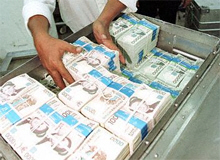
Typical street scene in Santa Ana, El Salvador. (Photo: iStock)
IMF Survey: IMF Works to Fight Money Laundering and Terrorism Financing
July 31, 2008
- Technical assistance bolsters countries' financial integrity
- Strong, sustained demand for IMF's assistance to address problems
- Increased collaboration with partners, donors, in assistance delivery
Money laundering and terrorism financing continue to plague many countries, threatening the integrity and stability of financial institutions and systems.

Money laundering and terrorism financing vulnerabilities can impede access to international financial and payments systems (photo: Reuters/Corbis)
ACTION AGAINST ILLICIT ACTIVITY
For the past seven years, the IMF has helped many countries strengthen their defenses in the battle against illicit activities.
Numerous countries have drawn on IMF assistance in drafting laws and regulations, and in developing strategies and methodologies for their financial sector supervisors. More generally, the IMF has helped countries develop the capacity of their financial sector supervisory agencies, financial intelligence units, and judicial officials.
The IMF assists its member countries by conducting assessments and providing technical assistance focused on legal, regulatory and supervisory frameworks. A multidisciplinary unit within the Fund's Legal Department—known as the Financial Integrity Group—is responsible for implementing the IMF's mandate on anti-money laundering and combating the financing of terrorism (often referred to by the acronym "AML/CFT").
Strong corporate governance, rule of law, and integrity are the key ingredients of well-functioning, modern financial markets. Underpinning these elements are effective AML/CFT regimes consistent with international standards. In many countries, AML/CFT regimes also support effective tax enforcement and thus fiscal administration.
Typically, the IMF evaluates countries' compliance with international AML/CFT standards and develops programs to help them address the identified shortcomings. Demand for IMF assistance has increased steadily every year since the institution became fully involved in 2001. In the past two years alone the IMF has conducted 12 AML/CFT assessments and 160 technical assistance missions in over 150 countries.
Different nations, different solutions
Money laundering and terrorism financing vulnerabilities can impede much-needed remittance flows and access to international financial and payments systems. The work undertaken by the IMF's Financial Integrity Group in South America has resulted in several successful projects combining the Fund's cross-country expertise with local knowledge.
The IMF has provided core technical assistance services (legislative drafting, training for financial sector supervisors, and capacity building for relevant government agencies) across a wide range of its membership.
Some projects are also developed on a regional basis—including plans to develop AML/CFT supervisory practices in Central America and a risk assessment project in the Pacific. The IMF's regional training centers play a central role in these efforts because they provide the facilities for training large numbers of people from the regions served by the centers.
International standards
The IMF takes a flexible approach to AML/CFT technical assistance, taking into account a country's stage of development, institutional capacity, overall level of commitment, and identified priorities. Also part of the picture are the broader implications of AML/CFT controls for the financial sector, as well as how these controls fit with other measures called for by international standards for regulating the financial sector.
In countries with limited administrative resources, the Fund often focuses on legislative drafting and institution-building in a way that respects the countries' economic limitations and other priorities. Hands-on seminars and workshops are a key means of passing along knowledge.
"The workshop, particularly the practical hands on case studies, really helped me to appreciate how [anti-money laundering] work fits into the big picture in my own economy," said a workshop participant at a recent event conducted by the Financial Integrity Group at the Joint Africa Institute in Tunis, Tunisia.
Focus on emerging markets
Engagement with emerging markets has expanded as officials and market participants realized that controls to counter money laundering and terrorism financing foster a favorable environment for cross-border financial flows and contribute to effective tax administration.
Effective laws and sound institutions, together with good governance practices, are essential components of healthy financial systems. This is especially so in countries that may be more vulnerable to sudden shifts in international capital flows. The IMF hopes to establish a multi-donor trust fund in AML/CFT to galvanize support for its technical assistance programs in emerging market countries to meet the strong demand coming from these countries.
Collaboration and coordination of Fund technical assistance with other strategic global, regional, and bilateral partners and donors is a priority. Wherever possible, and in order to avoid duplication, IMF staff leverage resources by cooperating with other agencies and donors.
With the help of funding from Canada, the IMF recently completed a program of work on AML/CFT supervision with the Eastern Caribbean Central Bank. Work is ongoing on another Canadian-funded, multifaceted AML banking supervision project that will significantly benefit seven Central American countries.
Restructuring for the future
The IMF's institutional restructuring plan will ensure it is better able to meet the future needs of its members. However, it has also meant a significant reduction in Washington-based staff. Still, the head of the Financial Integrity Group, Jody Myers, notes that the restructuring "has forced us to take a close look at the reasons we're in business and to identify the areas where we can have the greatest impact."
Moving forward, AML/CFT assistance will be more project based, drawing on a range of external experts supported by a core unit of expert IMF practitioners. Priority will be given to systemically important countries and those that present particularly significant money laundering or terrorism financing risks.
Comments on this article should be sent to imfsurvey@imf.org


